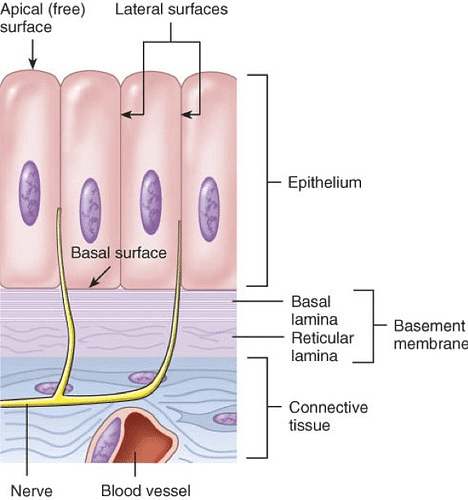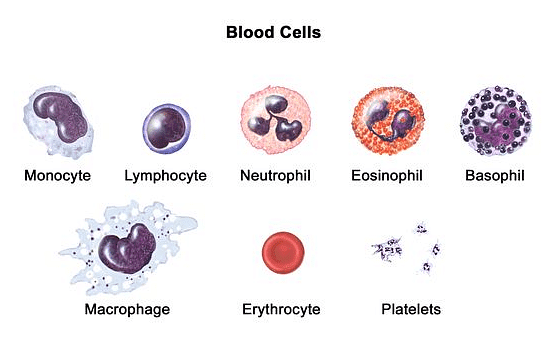Tissues Class 9 Notes Science Chapter 6
- The most abundant tissue in animal body is the connective tissue.
- The tissue which has minimum intercellular space is epithelial tissue and connective tissue has largest intercellular spaces.
 Intercellular Junction
Intercellular Junction - The epithelial tissue has great regeneration power and it is the first evolved tissue.
- Blubber of whale, hump of camel and thick tail of merino sheep mainly contain adipose tissue.
- The abnormality characterised by gradual softening and bending of bones caused by failure of calcification due to lack of vitamin D is called osteomalacia (Gr. osteon = bone, malakia = softness)
- The most abundant protein of the body is collagen, it accounts for about 40% of the total proteins. Wrinkling in old age is due to diminishing rigidity in collagen fibres.
- Decalcification: If a bone is kept in dilute acid like HCl, inorganic salts dissolves in acid and release CO2, while organic or protein part is left behind. Bone now becomes elastic and soft. This is called decalcification. In KOH solution muscles and connective tissue dissolve, but bone remains unaffected and it becomes clean. When a bone is burnt organic part (protein) burns and the remaining ash contains inorganic salts.
- Dried bone: When bone is exposed to high temperature it becomes dry. All cavities dry up and emptied.
- Clotting: Process by which the blood solidify and prevent haemorrhage.
- Antigen: A foreign substance or toxin which when introduced into the body of an organism stimulates the production of a specific antibody.
- Antibody: A plasma protein [Gamma globulin] produced by an organism to counteract an antigen in the tissue or blood.
- Glands: A group of cells which produces and secretes special chemicals.
- Infection: Invasion of the body by a pathogen.
- Matrix: The basic ground substance in which cells of a tissue are embedded.
- Monocyte: A granular leucocyte with a large nucleus. It escapes from the blood by amoeboid movement through the capillary wall and in the tissue is transformed into either macrophages or histiocyte.

- Fibroblast: Cells of connective tissue responsible for the secretion of fibres.
- Blood flows to all parts of the animal body and thus connects different parts of the body with one another.
- Lymphocytes: They secrete antibodies to destroy microbes and also help in healing injuries.
Practice Questions
Ques. Why does an organism—plant or animal, require different types of cells in the body?
Ans. Any organism will have a wide range of cell types. This is because each cell type specialises in one particular function. And for the proper working of an organism many functions like food transport, immunity, strength, etc., are needed to be performed properly.
Ques. Why are voluntary muscles also called skeletal muscles?
Ans. Voluntary muscles are also called skeletal muscles because they are mostly attached to the bones and help in body movement.
Ques. Why is the epidermis present as a thick waxy coating of cutin in desert plants?
Ans. A thick waxy coating of cutin is present in desert plants to prevent excessive loss of water during transpiration. Due to this, plants can survive in scarcity of water in deserts.
Ques. How are glandular epithelium formed?
Ans. An epithelial cell often acquires additional specialisation as gland cells, which can secrete substances at the epithelial surface. Sometimes, a portion of the epithelial tissue folds inward and a multicellular gland is formed. This is the glandular epithelium.
Ques.
(a) What is the lining of blood vessels made up of?
(b) What is the lining of small intestine made up of?
(c) What is the lining of kidney tubules made up of?
(d) Where are the epithelial cells with cilia found?
Ans.
(a) Squamous epithelium
(b) Columnar epithelium
(c) Cuboidal epithelium
(d) Respiratory tract
|
88 videos|369 docs|67 tests
|
FAQs on Tissues Class 9 Notes Science Chapter 6
| 1. What are tissues in biology? |  |
| 2. How many types of tissues are there in the human body? |  |
| 3. What is the role of epithelial tissue? |  |
| 4. Which tissue is responsible for movement in the body? |  |
| 5. How does connective tissue support the body? |  |

|
Explore Courses for Class 9 exam
|

|




















